This article is more than 5 years old.
In the winter of 1895 Oscar Wilde was the toast of the London stage. A production of his An Ideal Husband opened in January to critical and popular acclaim. His new play, The Importance of Being Earnest, had its premiere at the fashionable St. James’s Theatre on February 14.
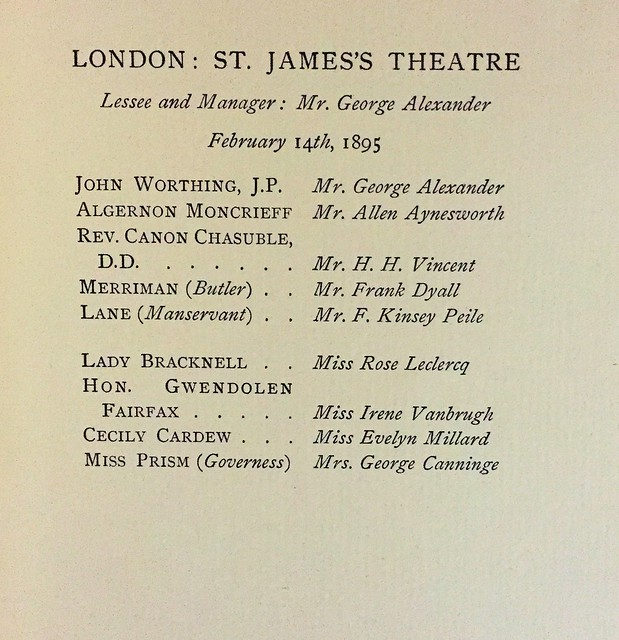
The opening night audience was delighted with the new comedy, but Wilde refused to appear for a curtain call at the premiere. His reluctance to appear in public was understandable, as he was being stalked by the Marquis of Queensberry, irate father of his current love interest, Lord Alfred Douglas.
Despite this simmering conflict, The Importance of Being Earnest was another huge success, playing to packed houses for the next six weeks.
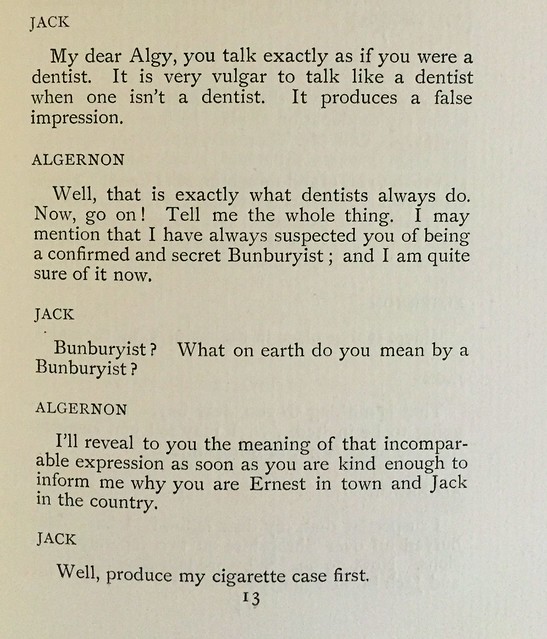
But Wilde’s private scandal eventually caught up with his public success. After Lord Queensberry publicly accused him of homosexuality (a serious crime in 19th century England), Wilde made the unwise decision to bring a libel suit against him. In one of the most famous series of trials in recent British history, Wilde not only lost his suit but, based on evidence uncovered by Queensberry, was arrested on April 5 on charges of “gross indecency.” He was eventually convicted and, despite many friends’ urging him to flee the country, served out his two-year prison sentence.
Immediately after Wilde’s arrest, his name was removed from all publicity materials for The Importance of Being Earnest. But it was to no avail—audiences boycotted Wilde’s play, and it soon closed. Unlike his earlier plays, the text was not published.
Upon his release from prison in 1897, Wilde moved to France. A few friends provided support, but most of his previous associates wanted nothing to do with him. Staging another play was out of the question, but Wilde hoped that he might earn some money by bringing out published versions of An Ideal Husband and The Importance of Being Earnest.
He made overtures to Leonard Smithers, who had published his poem The Ballad of Reading Gaol, which Wilde had written while in prison. The Ballad had, to everyone’s surprise, sold extremely well in spite (or perhaps because) of Wilde’s notoriety. But Smithers, who had financial troubles of his own, was reluctant to pay Wilde’s asking price of £50 for the two plays. He eventually agreed to pay the author a much smaller advance and to share any profits from the sale of the plays.
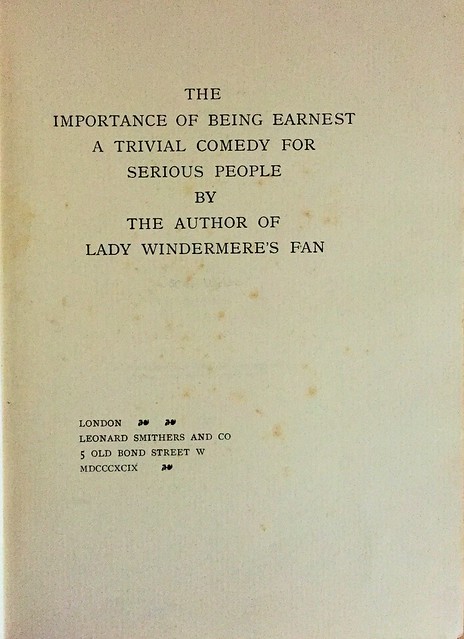
Smithers prepared The Importance of Being Earnest for publication first. Since Wilde apparently had no copy of the text, Smithers borrowed the working copy from the manager of the St. James’s Theatre. Wilde edited this text, making corrections and removing most of the stage directions.
Wilde requested that Charles Hazelwood Shannon design the book’s cover. Shannon had done the covers for editions of Lady Windermere’s Fan and A Woman of No Importance, and Wilde admired his “simple and severe” designs.
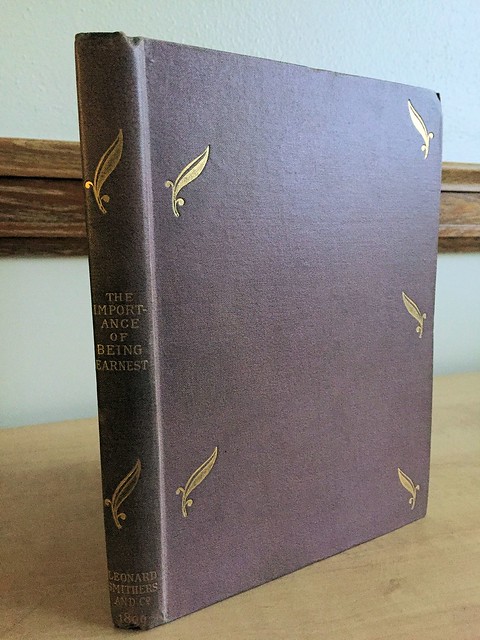
The Chiswick Press printed the sheets for The Importance of Being Earnest in January 1899. The edition included 1000 numbered copies, 100 signed and numbered oversize copies on handmade paper, and twelve special presentation copies on Japanese vellum.

The Importance of Being Earnest was published in February 1899. Unfortunately for Wilde, it did not sell well enough to provide the income he desperately needed. Many newspapers refused to review the book, and booksellers refused to carry it. By the summer of 1899 Wilde agreed to sell the copyright to Smithers for £20.
Oscar Wilde died, disgraced and destitute, in November 1900. Had he lived a few decades longer, he would have seen his works become even more popular than they had been in his lifetime.
ZSR Library’s copy of the first edition of The Importance of Being Earnest was once owned by Alexander Hamilton Rice and his wife Eleanor Elkins Rice, who were avid collectors of Wilde’s books.
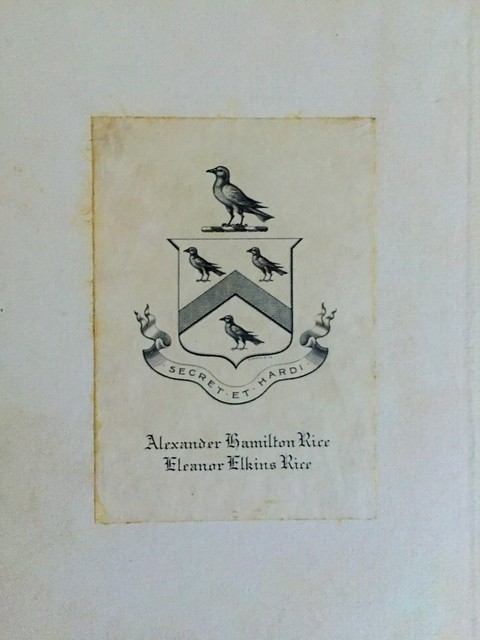
The play was revived for the first time in 1902, and again with considerable success in 1909. The 1909 revival marked the first time since Wilde’s arrest that the author’s name had appeared on the program for one of his plays. By the 1920s Wilde’s reputation as a writer had been fully restored, and The Importance of Being Earnest quickly established itself as his best-known and most-loved play. A century later, it remains one of the most frequently performed English plays. Despite its inauspicious beginnings, Wilde’s “trivial comedy” is now a classic.
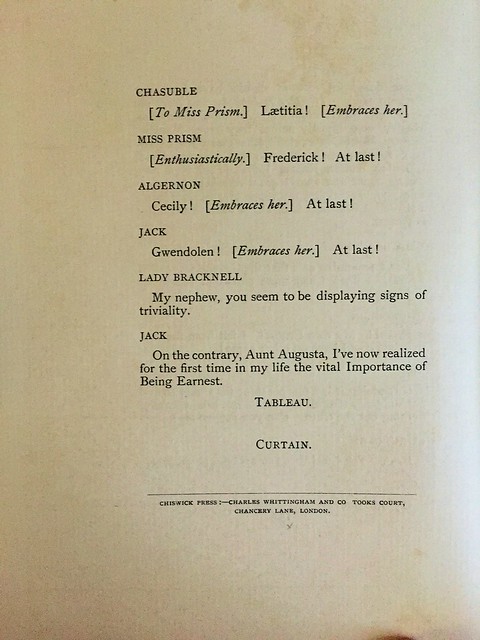

3 Comments on ‘The Importance of Being Earnest, by Oscar Wilde (1899)’
Thanks so much for posting this! I’m going to buy my tickets for Sunday’s show right now!
I love reading these posts, Megan. They add so much to the experience!
Your post was delightful! Thank you, Megan.